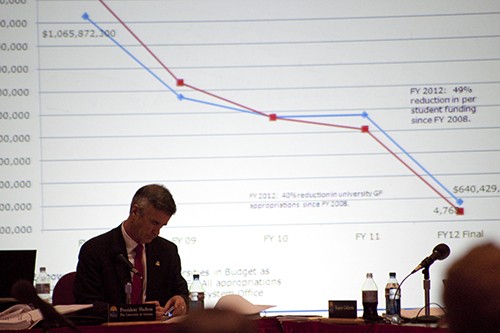Mark Killian, a member of the Arizona Board of Regents, described a conversation he had with his son before the regents’ vote to raise tuition on Thursday.
“”My one son nailed me (with a question) last night and said ‘Dad, you’re not going to raise tuition, are you?'”” Killian said. “”I’m sure there are many families in the same situation.””
The controversy of tuition and how it would affect families and students dominated the regents’ discussion about whether to accept the tuition and fee proposals put before them by the three university presidents: Robert Shelton of the UA, Michael Crow of Arizona State University and John Haeger of Northern Arizona University.
The regular discussion was derailed by a motion from Regent Chair Anne Mariucci, who suggested the board accept ASU’s proposal, but not the UA’s or NAU’s. Mariucci said she felt that those two universities, which each have uncommitted cash reserves on hand, should place priority on offsetting budget shortfalls by using those reserves before raising tuition.
Regent Rick Myers proposed an amendment to the motion that passed the tuition proposals for both the UA and NAU, but used the two institutions’ reserve funds to give financial aid awards to students. That amount was set at $750 for the UA resident undergraduate students and $350 for new NAU freshmen enrolling next year.
This means that though UA resident undergraduate students would still see a $1,500 increase in tuition next year, each of those students will receive a financial aid award to offset half of that increase. Graduate and non-resident tuition levels were approved at their originally proposed levels.
The UA has $271 million in cash reserves, NAU has $110 million and ASU has $179 million, according to Mariucci, though most of these funds are either earmarked for new projects or otherwise committed.
Mariucci said the regents have a “”remarkable opportunity”” to give these funds back to students as a form of “”tax rebate”” for tuition payments.
Shelton’s tuition proposal already includes using $18 million of the UA’s $28 million in uncommitted cash reserves to offset the state budget cuts. The other $10 million would go to address increases in the UA’s operating costs.
Haeger, however, said he thought the discussion of using reserves was off base.
“”The issue of reserves is absolutely the wrong issue, with all due respect,”” Haeger said. He said that in the lead-up to the financial “”cliff”” when money from the federal stimulus act would no longer be available, the board had asked the universities to build their reserves.
“”To change course makes us absolutely unable to manage the institution’s budget,”” Haeger said, before stating that using reserves would “”would literally bring the institution close to bankruptcy.””
Haeger also said that using too much of NAU’s reserves could endanger NAU’s Pledge program, which locks freshman tuition for eight semesters, a claim Mariucci called “”disingenuous.””
Regent Dennis DeConcini proposed an amendment that would eliminate proposals of differential tuition and fees for freshmen and sophomores. The amendment was originally passed 6-to-3 but the regents brought it up for further discussion. Another 5-to-4 vote eliminated the amendment.








